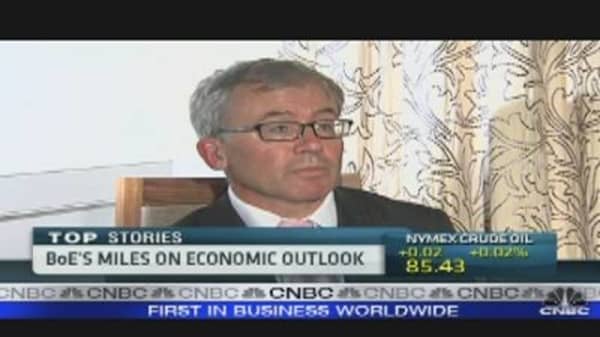A leading British economic policymaker defended the Bank of England's (BoE) 75 billion pounds ($114 billion) boost to its money-printing program Tuesday.
BoE Monetary Policy Committee (MPC) member David Miles, the former Morgan Stanley economist who is best known for his work on the UK mortgage market, reaffirmed the Bank's commitment to buying gilts (government bonds) instead of other asset classes in an interview with CNBC.
Some have said that buying other asset classes as part of quantitative easing might be more effective at bolstering slowing growth rates in the UK.
"There are very strong reasons for thinking that buying gilts will have very strong knock-on impacts," Miles told CNBC after a speech to the Royal Economics Society.
"One of the difficulties with enlarged quantitative Bank of England buying of corporate debt is that the Monetary Police Committee would be drawn into making credit decisions such as: 'Should we buy this company's debt?' 'Is this too risky?'"
"The MPC isn't the natural place to make those kind of credit decisions," he added. "If we can have a beneficial impact by buying gilts it has the advantage of buying in a very liquid market without having to make those decisions between companies."
The number of tricks up the MPC's sleeve to influence the British economy has got smaller since the crisis began. It has already kept interest rates at 0.5 percent for close to three years, its longest period of inaction since World War II, with no sign of imminent change.
Worsening News
Its stock of asset purchases had stayed at 200 billion pounds since February 2010, when the outlook for the British economy was more optimistic. Last Friday, it announced that this was being increased by 75 billion pounds.
The most recent expansion of quantitative easing came in response to worsening news from the UK and the euro zone, its biggest trading partner, Miles said.
"The news that had come through in the last few weeks meant that the outlook for demand in the UK just looked that much weaker," he said.
"Commodity prices had fallen and therefore the inflationary pressures for a year or 18 months down the road just looked weaker than in August, so because the outlook for inflation and demand was weaker, the decision was made to make monetary policy even more expansionary," Miles explained.
Last week, Moody's cut the rating of 12 British financial institutions, saying it sees a decreased likelihood of government support for them.
Some in the market have suggested that the most recent move by the MPC might bring the pound's exchange ratedown, which would help exports.
"I think there are other mechanisms that are more reliable, direct and quite powerful (than asset buying)," said Miles.
"(Other mechanisms include) changing prices of a range of assets including corporate bonds, making it easier for banks to at least maintain their lending by easing conditions in bank funding markets and having a general positive knock-on impact on a range of asset classes that might include equities as well as corporate bonds," he added.





